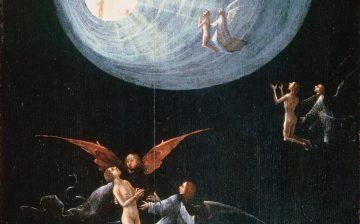John Gray in New Statesman:
 There are many arguments for theism, most of them not worth rehearsing. The ontological argument, first formulated by St Anselm in the 11th century and reframed by the 17th-century French rationalist René Descartes (1596-1650), maintains that God must exist because humans have an idea of a perfect being and existence is necessary to perfection. Since many of us have no such idea, it is a feeble gambit. The arguments of creationists are feebler, since they involve concocting a theory of intelligent design to fill gaps in science that the growth of knowledge may one day close. The idea of God is not a pseudo-scientific speculation.
There are many arguments for theism, most of them not worth rehearsing. The ontological argument, first formulated by St Anselm in the 11th century and reframed by the 17th-century French rationalist René Descartes (1596-1650), maintains that God must exist because humans have an idea of a perfect being and existence is necessary to perfection. Since many of us have no such idea, it is a feeble gambit. The arguments of creationists are feebler, since they involve concocting a theory of intelligent design to fill gaps in science that the growth of knowledge may one day close. The idea of God is not a pseudo-scientific speculation.
A different and more interesting approach is to argue that theism is suggested by the fact that we experience ourselves as unified, conscious beings – in other words, as having a soul. Not necessarily an immaterial entity, the soul is the part of us that strives to realise what is best in our nature. We do not come to know the soul through any special revelation. We know it by considering the kind of creature we find ourselves to be – a thinking being inhabiting a life-world that seems to reflect a mind greater than our own. Once we realise we have a soul, theism becomes a credible way of thinking.
Such is the approach adopted in this lucid and illuminating book by John Cottingham, professor of the philosophy of religion at University of Roehampton. Modestly described as an essay, Cottingham’s short study explores fundamental questions more fully than many much longer volumes. While it fails as an argument for theism, it is forceful and compelling in arguing that the idea of selfhood taken for granted in secular societies makes sense only in the context of a theistic world-view.
More here.
